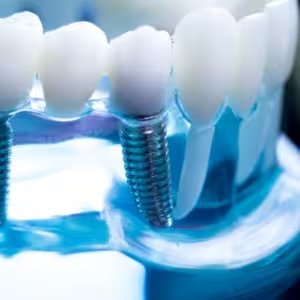
As we age, maintaining good oral health becomes increasingly important for overall well-being. Dental implants offer a reliable and long-lasting solution for seniors who have lost teeth due to age, decay, or other dental issues. Dr. Ninh at Dental 32 in Ashburn, VA, understands the significance of dental implants in restoring oral function and enhancing quality of life for seniors. In this blog post, we will explore the process of getting dental implants as a senior, including benefits, considerations, and what to expect during treatment.
What Are Dental Implants?
Dental implants are titanium posts surgically inserted into the jawbone to replace missing tooth roots. They provide a stable foundation for artificial teeth (crowns, bridges, or dentures) that look, feel, and function like natural teeth. Dental implants offer several advantages over traditional tooth replacement options, such as improved chewing ability, speech clarity, and preservation of jawbone structure.
Benefits of Dental Implants for Seniors
Improved Oral Function: Dental implants restore biting and chewing function, allowing seniors to enjoy a diverse diet and maintain proper nutrition.
Natural Appearance: Implant-supported restorations blend seamlessly with natural teeth, providing a natural-looking smile and enhancing facial aesthetics.
Longevity: With proper care, dental implants can last a lifetime, making them a durable and cost-effective solution for seniors.
Preservation of Jawbone: Implants stimulate the jawbone, preventing bone loss and maintaining facial structure over time.
Process of Getting Dental Implants
1. Initial Consultation and Assessment
The journey towards dental implants begins with a comprehensive consultation with Dr. Ninh at Dental 32. During this visit, seniors can expect:
Evaluation: Dr. Ninh examines oral health, assesses bone density, and discusses medical history to determine candidacy for implants.
Treatment Plan: A personalized treatment plan is developed based on individual needs and desired outcomes.
2. Preparation for Implant Placement
Before implant surgery, seniors may undergo preparatory procedures to optimize oral health and ensure successful implant placement:
Bone Grafting: If jawbone density is insufficient, bone grafting may be recommended to augment bone volume and support implants.
Tooth Extraction: If necessary, existing damaged teeth are extracted to prepare the implant site.
3. Implant Placement Surgery
The implant placement procedure is typically performed in stages and involves:
Anesthesia: Local anesthesia is administered to ensure comfort during surgery.
Implant Placement: Dr. Ninh precisely positions titanium implants into the jawbone beneath the gum tissue.
Healing Period: Over several months, the implants fuse with the jawbone through a process called osseointegration, providing a stable foundation for prosthetic teeth.
4. Healing and Integration Phase
During the healing period:
Follow-up Visits: Seniors visit Dental 32 for regular check-ups to monitor healing and assess osseointegration progress.
Temporary Restorations: Temporary crowns or dentures may be provided to maintain aesthetics and function while implants heal.
5. Final Restoration Placement
Once implants have integrated with the jawbone:
Impressions: Dr. Ninh takes impressions of the implant sites to fabricate custom-made crowns, bridges, or dentures.
Final Placement: The permanent restorations are securely attached to the implants, completing the restoration process.
6. Post-Treatment Care and Maintenance
Maintaining oral hygiene and regular dental visits are crucial for the long-term success of dental implants:
Brushing and Flossing: Seniors should brush twice daily and floss around implant-supported restorations to remove plaque and prevent gum disease.
Professional Cleanings: Schedule routine dental check-ups and cleanings at Dental 32 to monitor oral health and ensure the integrity of implants.
Considerations for Seniors Considering Dental Implants
Overall Health: Seniors should be in good general health and have well-controlled medical conditions to undergo implant surgery successfully.
Bone Density: Sufficient jawbone density is essential for implant stability and long-term success. Bone grafting may be recommended for seniors with bone loss.
Smoking and Alcohol: Quitting smoking and limiting alcohol consumption improves healing and reduces the risk of implant complications.
Financial Considerations: Discuss dental insurance coverage and financing options with Dr. Ninh to make informed decisions about treatment costs.
Myths About Dental Implants for Seniors
Age Limitations: There is no upper age limit for dental implants. As long as seniors are healthy and have adequate bone support, they can benefit from implants.
Pain and Discomfort: Modern anesthesia and sedation techniques ensure a comfortable implant placement experience for seniors.
Longevity and Durability: Dental implants are designed to last for decades with proper care, making them a reliable investment in oral health for seniors.
Conclusion
Dental implants offer seniors a permanent and natural-looking solution to replace missing teeth and restore oral function. By understanding the process of getting dental implants, seniors can make informed decisions about their oral health care and achieve a confident smile that enhances their quality of life. Dr. Ninh and the team at Dental 32 in Ashburn, VA, are dedicated to providing compassionate care and comprehensive dental solutions tailored to seniors’ unique needs. Schedule a consultation today to explore dental implant options and embark on the path towards improved oral health and well-being in your senior years. Trust in expert guidance and advanced dental technology to achieve lasting results with dental implants at Dental 32.
FAQ
Non-covered benefits may not be deemed medically necessary by insurance providers but can still be essential for maintaining dental health.
If a procedure isn’t covered by insurance, it’s essential to discuss alternative payment options with your dentist and budget for the expense accordingly.
Regular dental check-ups are critical for preventive care, regardless of insurance coverage. Skipping them can lead to more significant dental issues in the future
Budgeting for dental expenses ensures that you can cover the costs of non-covered benefits and access necessary treatments when needed.
